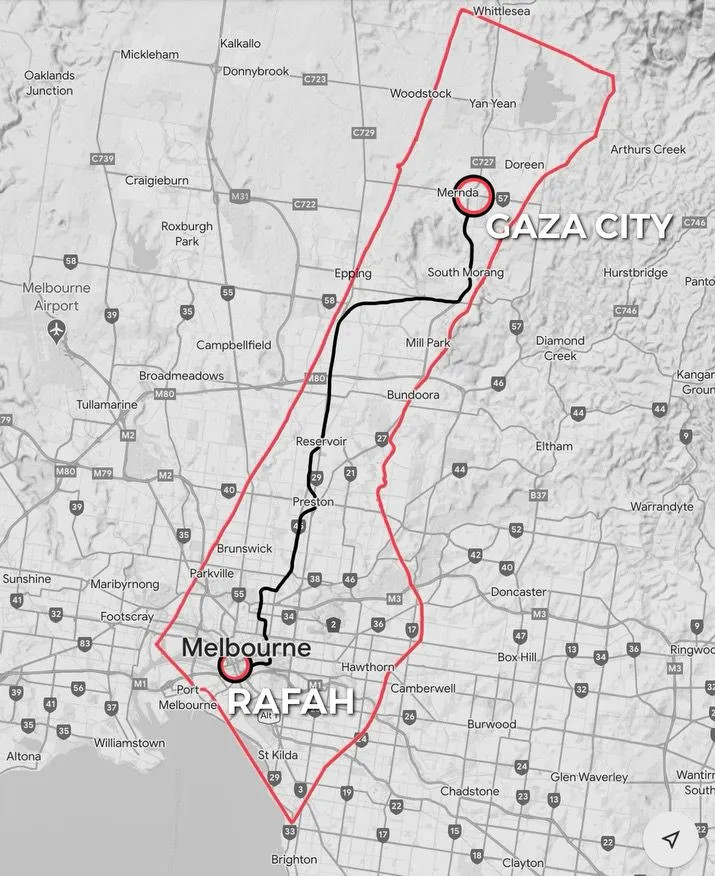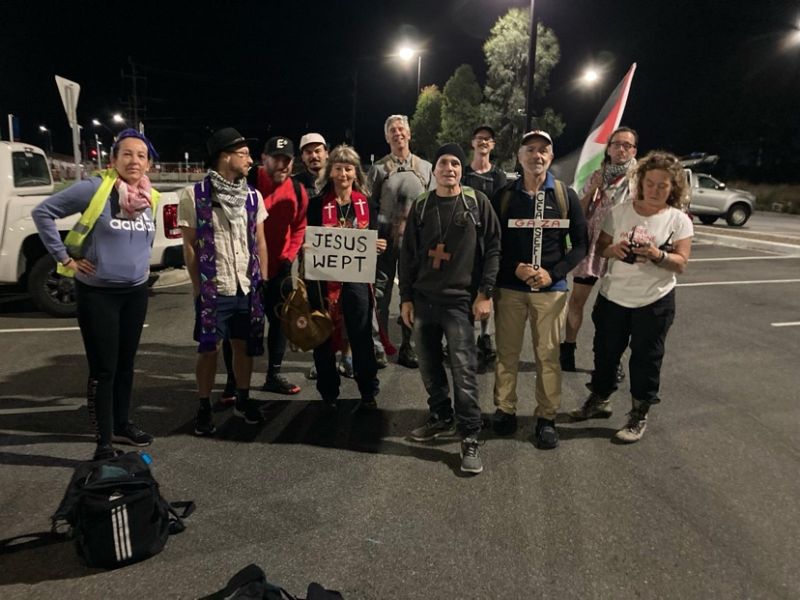Inspired by the act of James Harris, a Kiwi who walked 41km, equal to the length of Gaza in solidarity with the people suffering there, Nils von Kalm joined a group on a Gaza Pilgrimage. He’s given The Other Cheek permission to excerpt his account. The Gaza Pilgrimages also suggest the option of walking a distance based on the numbers killed including those on October 7.
The Melbourne pilgrimage (the first one to take place) which I did was (appropriately) on Ash Wednesday. I say “appropriately” because one of the reasons we’re doing these walks is as an act of repentance.
In Jarrod [Mckenna – one of the organiser’s – ] words,
“The power of the pilgrimage is to allow the geography of the horror happening in Gaza to become real in our home cities. To flee Gaza City to hope to find refuge in Rafah in the south, that’s only the distance of Hillary’s Boat Harbour to Fremantle in my home town. You’d still hear the blast of bombs destroying your home. You’d see the clouds of dust and debris.
“On pilgrimage, in solidarity, we can start to transfigure our vicarious trauma into action as we realise in our bodies that 2 million displaced people can’t find shelter from bombardment no matter where they are in that small area.”
I didn’t actually get through the whole walk. My hip and legs became too painful after about 10 miles. It made me realize the privilege I have, that I can just step out when I need to. The people fleeing the bombing in Gaza have no such luxury.
It also reminded me of the quote above from Mother Pollard, a dear elderly lady who was involved in the Montgomery bus boycotts in the mid-1950s, led by Martin Luther King.
Because she was in her early 70s then, King had suggested to her that, after several weeks of walking to her destinations rather than taking the bus, that she might take the bus again for the sake of her health. She replied, “My feets is tired, but my soul is rested.”
That’s how many of the 50 or so of us felt as we did our own pilgrimage.
As well as walking in prayerful solidarity with the people of Gaza, the pilgrimages have four ‘asks’:
1. Enduring and Sustained Ceasefire.
2. Immediate flow of life saving food, water, aid, fuel and humanitarian assistance.
3. Release of all hostages — both the Israeli hostages held by Hamas — and the Palestinian hostages held in the Israeli prison system.
4. End of occupation so a just-peace can begin.
Part of the liturgy we read during the day also mentioned how walking on stolen land (as Australia is from its indigenous people) for protest and power has a long tradition in Australia. It also mentioned that we join with the Freedom Bus Riders in 1965.
It was those Freedom Bus riders, as well as anyone else who wanted to join the civil rights movement, who had to commit to certain core convictions. So it was with us. They included walking in Jesus’ way of nonviolent enemy-love, standing against any form of antisemitism and Islamophobia, being led by Palestinian Christians, and that nonviolent solidarity doesn’t mean being neutral. Jesus takes sides, and it’s alway the side of the oppressed, whoever they are.
As I continue on in this life of following Jesus, I’m more convinced than ever that the greatest human need is to feel heard and seen. Palestinians haven’t been heard and seen for decades. They want their stories to be told by people who know. They want to be acknowledged by people who have bothered to get to know them.
So, these pilgrimages, which at last count numbered 125 in 19 countries, were a way of doing that. [The Other Cheek just updated those figures.]
The first of our group started at 3.50am at a train station in the northern suburbs of Melbourne, and we finished at St Paul’s Cathedral in the heart of downtown Melbourne at 6pm that evening. On the way we sang, we prayed and we read liturgies, supported by various churches as well as a mosque and a group of Jewish friends.
This was peacemaking as Jesus envisioned it. And he said it is peacemakers who are the true children of God.
As well as the aforementioned support, I can’t tell you how often we received toots of encouragement from passing drivers. At one stage, you could have thought there was a major traffic jam, there were so many horns going off from passers by. I felt quite emotional hearing them.
…
One of the passages of our liturgy we recited at times during the walk was Jeremiah 31:15 –
”This is what the Lord says: “A voice is heard in Ramah, mourning and great weeping, Rachel weeping for her children and refusing to be comforted, because they are no more.””
“Ramah” could easily be replaced with “Rafah”.
The next verse of that passage is one of comfort from God. Given the gratitude of Palestinians we met on the walk, and the countless toots from drivers passing by, we hope that some Palestinians felt heard. They certainly need to.

Credit: Jarrod McKenna
Main Pic: the Pilgrims set off from Merida to walk to Melbourne.
A note from The Other Cheek: Readers will have noticed we have covered both the “Never Again” rallies (against Anti Semitism and defending the Australian jewish Community) and the Gaza Pilgrimage (responding to the people suffering in Gaza.) We cover both of these because they are actions by members of the Christian community and news worthy.
It is also possible for a Christian in good conscience to attend both protests. The core aims of each, are not in contradiction to each other also some material such as speeches may be.

